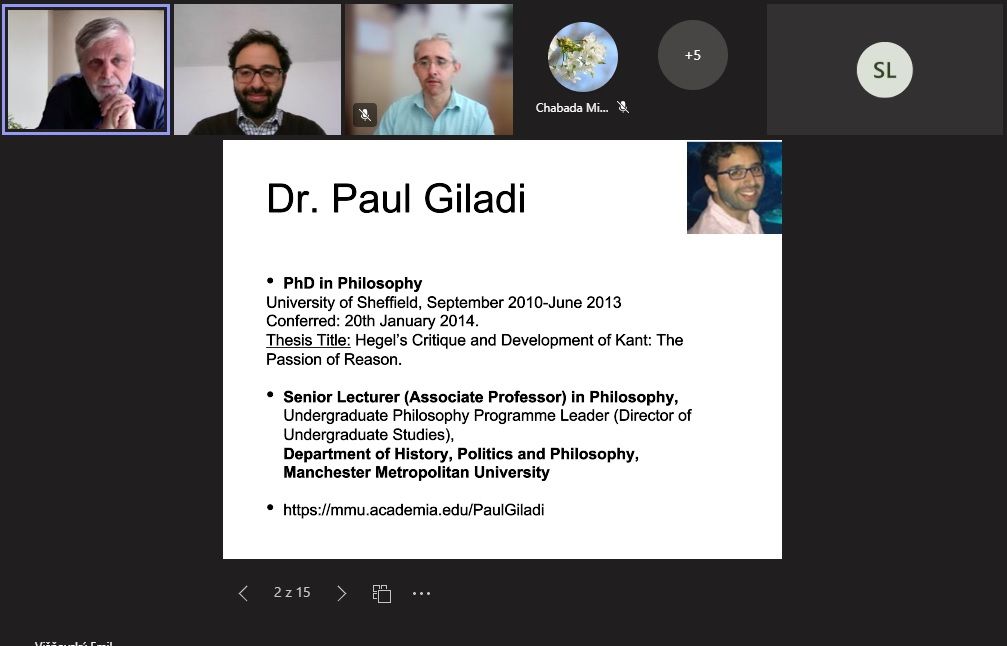The 6th of our workshops took place on 26th of may 2022 as an online conference. The central topic of the workshop were the non-reductive conceptions of naturalism within the framework of philosophical pragmatism. The first speaker was a foreign guest dr. Paul Giladi from Metropolitan University in Manchester. Then a member of our research team Emil Višňovský from the Department of Philosophy and History of Philosophy at Comenius University in Bratislava gave his presentation. Finally, Róbert Maco from the same institution and also our team member, critically responded to previous contributions.
At the beginning of the workshop, prof. Emil Višňovský introduced dr. Paul Galadi by way of general summary of his philosophical interests and via the selection of author's publications which were directly related to the workshop's theme.

Dr. Giladi gave his presentation Pragmatist Conception of Naturalism thereafter. As the title suggest, the aim of this talk was to review various conceptions of philosophical naturalism from the point of view of pragmatist tradition - starting with its classical era (Ch. S. Pierce, W. James, J. Dewey) up to contemporary period of so called "New Pragmatism". Giladi used this foundation to point out that pragmatists - from W. James to H. Price - were exponents, or at least were partial to, so called "non-reductive" or "liberal" naturalism. This kind of naturalists are critical towards so called "reductive" or "scientific" naturalism which conceives the scientific image of the world as the correct one. Throughout the presentation, Giladi has highlighted several times that most of contemporary pragmatists strive to see the world not only from the scientific, but also from the normative, culturally-theoretical perspective, in virtue of, for example, being engaged in investigations of the political and ethical implications of naturalism. Giladi concluded by suggesting that naturalist component of pragmatist philosophy up till 1940s can be taken as a good starting point for a new critical reflection of naturalism from the normative and culturally-theoretical perspective.

Prof. Emil Višňovský expanded upon Giladi's presentation with a talk titled "Non-reductive Conceptions of Naturalism", in which he explored in more detail the main characterstics of non-reductive naturalism of pragmatist philosophy. According to Višňovský, an essential feature of non-reductive naturalism is to resolve traditional philosophical antinomies between nature and culture, mental and physical, subjective and objective, etc. In view of this, Višňovský pointed out that it is important to understand non-reductive naturalism as "global", covering all phenomena and domains, including the philosophy of nature, of culture, of mind, ethics, and so on. This directly contradicts the scope and ambitions of reductive naturalism which aims to reduce all phenomena and domains to the ontology of natural sciences. In opposition, Višňovský claimed that the ontology of all these domains is not reducable to some one domain, that is, the ontology is supposed to be pluralistic. For example, someone can be a naturalist in ethics, whitout reducing moral or normative concepts to concepts of natural sciences. This assumption made Višňovský to propose to supplant the concept of "non-reductive naturalism" with the concept of "pluralistic naturalism".

In the final presentation titled as Critical Notes on Pragmatist and Non-reductionist Conceptions of Naturalism, dr. Róbert Maco has proposed some evaluations of preceding contributions. He focused himself on the relationship between non-reductive nad other forms of naturalism - specifically on reductive naturalism and supernaturalism. According to Maco, a problematic feature of naturalism is its "excessive openness" or "liberalism" - althought non-reductive naturalists deny supranatural phenomena (e.g., cartesian souls), they are also trying to preserve the autonomy of mental phenomena (such as consciousness or intentionality) or normative phenomena (e.g., rules, institutions), which reductive naturalists strive to explain solely on the basis of phenomena of natural sciences. This can lead one to suppose that almost any philosopher can be supposed to be a "naturalist", including ones which hold properly non-naturalist or supernaturalist positions. The ensuing discussion has showed, on the other hand, that the openness of non-reductive variants of naturalism has also some benefits, since we currently lack any naturalist explanation of some mental or normative pehenomena, the importance of which is stressed by non-reductive naturalists.
Lively and inspiring discussion at the end of the workshop has shown that non-reductive naturalism appears to be an attractive position in contemporary philosophy. But defining features of non-reductive naturalism remain unclear, which is an impetus towards further philosophical investigations.


